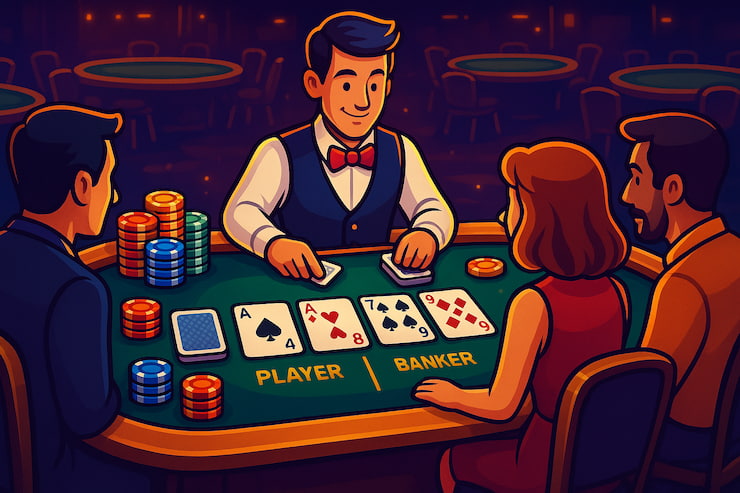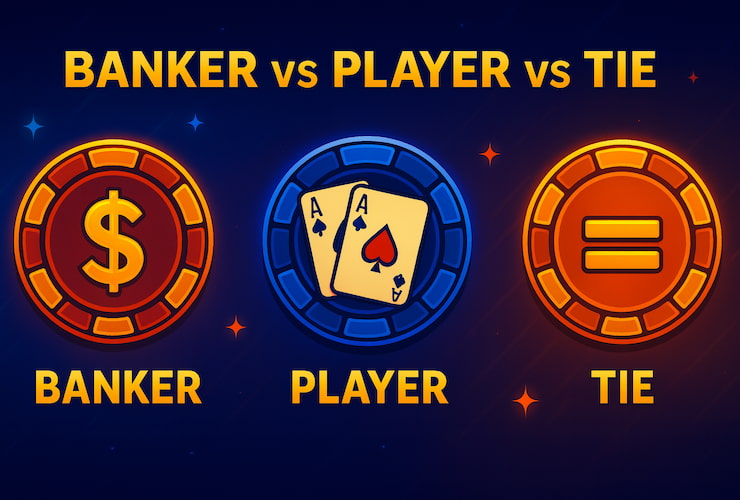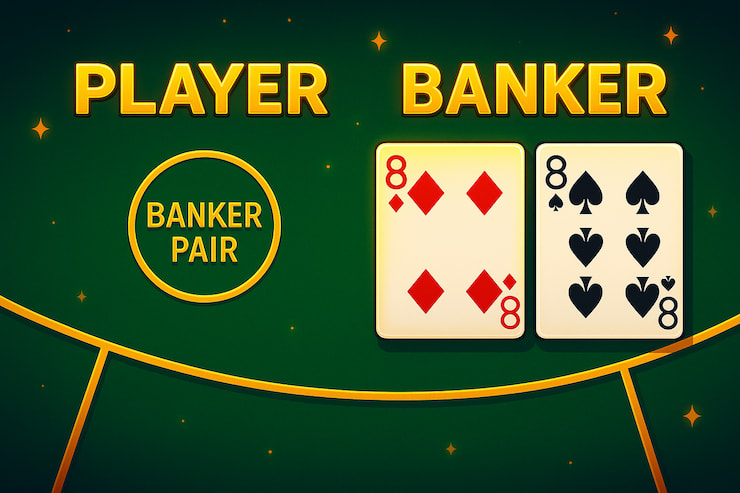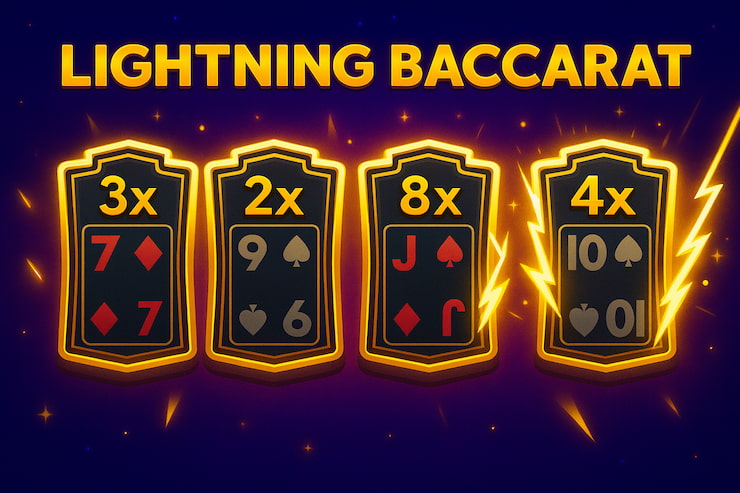Baccarat has long been known as one of the fairest games in the casino. Unlike online slots or roulette, where the house edge can be steep, the odds of baccarat are very straightforward.
Understanding baccarat odds isn’t about finding a “trick” to beat the game but knowing the math that drives every bet. When you know the actual probabilities, you can make smarter choices about where to place your chips and avoid mistakes many beginners make.
In this guide, we’ll break down exactly what are the odds in baccarat, how payouts work for each bet, and why the house edge matters. We’ll also look at side bets and explore how modern game variations can change the odds.
Introduction to Baccarat Odds
So, what are the odds in baccarat? In simple terms, odds describe the likelihood of winning a particular bet. Like in any other casino game, they’re expressed as probabilities that show how often a result will occur over the long run.
In baccarat, the Banker bet wins slightly more often than the Player bet, while the Tie bet lands much less frequently, which is why it comes with a higher payout.
How Baccarat Odds Are Calculated
These odds are calculated using the total number of possible card outcomes and the rules that apply when a third card is drawn. Since baccarat follows fixed dealing rules, the math behind each bet is consistent and predictable.
However, some baccarat variations, such as No Commission Baccarat or Lightning Baccarat, adjust the rules slightly, which means the odds and house edge can shift depending on which version you’re playing.
By understanding the odds and the payouts for each bet type, you can make informed choices instead of betting randomly. And while baccarat is a game of chance, knowing the rules matters. A clear grasp of how the game works helps you judge bets logically, spot the best-value options, and choose baccarat variations that give you the strongest chance over time.
How Baccarat Works – Rules and Gameplay Basics
Before you can really understand baccarat odds, it helps to know exactly how the game is played. Baccarat is simple compared to most casino games, which is one reason it appeals to both beginners and experienced players. Once you understand the flow of a round and how hands are scored, the odds will make a lot more sense.
The Objective of the Game
Your goal in baccarat is to bet on which hand will finish closest to a total of 9. You’re not competing directly against the dealer or trying to build your own hand like in blackjack. Instead, you predict the outcome of two hands that are dealt according to fixed rules (the Player and the Banker).
Card Values and Rankings
Card values and ranking are straightforward in baccarat. Aces are worth 1, cards from 2 through 9 are worth their face value, and 10s and face cards are worth 0. When a hand goes over 9, the first digit is dropped. For example, a total of 15 becomes 5, and a total of 20 becomes 0. This system makes baccarat quick and easy to follow once you’ve seen it in action.
Baccarat Step-by-Step
Each round of baccarat follows the same sequence, even if rules vary slightly depending on the game variants.
Here’s how it works:
- Players place their bets on Banker, Player, or Tie.
- Two cards are dealt to each side, one for the Banker and one for the Player.
- If either side totals 8 or 9, this is called a natural win, and the round ends immediately.
- If no natural win occurs, the third-card rules determine whether Banker or Player draws an extra card. These rules are automatic and carried out by the dealer.
- The final totals are compared, and the hand closest to 9 is declared the winner.
This fixed structure makes baccarat easy to follow. Once you know the sequence, you can focus on choosing the bets that align with the best baccarat odds rather than worrying about the details of the dealing rules.
How Odds Work in Baccarat
Since the game follows strict dealing rules, the odds can be calculated precisely. Therefore, the best way to choose which side to bet is to compare the odds of winning with the relevant payout.
How Odds Are Calculated
Every bet in baccarat has a probability based on all the possible card combinations. Since cards are dealt from multiple decks, the calculations consider the likelihood of different totals and how the third-card rule may come into play.
Due to these rules, the Banker hand has a slight advantage, which is why it wins more often than the Player hand. Casinos balance this advantage with a commission on Banker wins, keeping the game fair while maintaining a house edge.
Payouts for Each Bet Type
The payouts in baccarat are straightforward and the same for most baccarat tables.
Here’s a quick guide to baccarat payouts:
| Bet Type | Payout |
| Banker | 1:1 (minus 5% commission) |
| Player | 1:1 |
| Tie | 8:1 (or 9:1) |
House Edge in Baccarat
Does baccarat have the best odds compared to other casino games? Understanding the house edge is the first step to determining the baccarat odds of winning.
The house edge represents the casino’s built-in advantage on each bet, explaining why some bets are safer over the long run. In baccarat, the numbers are clear and consistent, which is why players consider it one of the fairest casino games.
Banker vs Player vs Tie
The Banker hand wins about 45% or 46% of the time. After accounting for ties, the Banker bet has a house edge of roughly 1.06%. The Player hand comes close, winning around 44% to 45% of the time, which leaves it with a slightly higher edge of about 1.24%.
The Tie bet only lands in about 9 percent of rounds, which results in a house edge above 14% even with an 8:1 payout. This is why experienced players almost always avoid betting on a Tie.
How the Commission Affects the Banker Bet
Without commission, the Banker bet would be too strong compared to the Player bet. That is why casinos take a standard 5 percent commission on Banker wins. Even after this adjustment, the Banker remains the best option on the table, which is why many baccarat strategies recommend it as the go-to choice.
Baccarat Odds Compared to Other Casino Games
If you compare baccarat to other casino staples, the numbers stand out. Roulette can carry a house edge of 5% or more, slots often range from 4% to 10%, and even craps bets vary widely.
Comparing baccarat odds vs blackjack, the latter can offer a lower edge than baccarat, but only if you play with perfect strategy. Baccarat casino sites consistently provides one of the best options for players who want strong odds without needing advanced skills.
Banker Hand Odds and Payouts
The Banker bet is the strongest option in baccarat, which is why most players tend to bet on it. Thanks to the third-card rule, the Banker hand has a slight but consistent advantage over the Player hand.
The Banker wins about 45.86% of the time, the Player wins about 44.62%, and the remaining outcomes are ties. Because of this slight edge, casinos apply a 5% commission on Banker wins to keep the game balanced. Even after the commission, the Banker bet carries the lowest house edge at around 1.06%.
If you bet on the Banker and it wins, you receive a 1:1 return minus the 5% fee. For example, a $100 bet would return $95 in profit plus your original stake. While this commission may initially seem like a drawback, the math shows that Banker is still the most favorable choice in the long term.
| Bet Type | Odds of Winning | Payout |
| Banker | 45.86% | 1:1 (minus commission) |
Player Hand Odds and Payouts
The Player bet is the second-best option in baccarat. It wins slightly less often than the Banker but doesn’t incur a 5% commission. This makes it simpler to calculate at the table and attractive to players who prefer even payouts.
The Player hand wins about 44.62% of the time. The house edge is roughly 1.24%, which is still far better than most casino games but a little worse than the Banker bet. The payout is 1:1, meaning you double your money if your bet is correct.
| Bet Type | Odds of Winning | Payout |
| Player | 44.62% | 1:1 |
Tie Bet Odds and Payouts
The Tie bet is the least favorable option in baccarat. It occurs only about 9% of rounds, but casinos offer big payouts to tempt players. Most tables pay 8:1, though some pay 9:1, which improves the return slightly but still leaves a disadvantageous house edge.
| Bet Type | Odds of Winning | Payout |
| Tie | 9.52% | 8:1 |
Baccarat Side Bets and Their Odds
While the main bets of Banker, Player, and Tie are straightforward, most casinos also offer side bets. These are designed to add variety and excitement but usually come with a much higher house edge.
Understanding the baccarat odds behind side bets helps you see why they are risky compared to the main options.
Common Side Bets (Pair, Perfect Pair, Big/Small, Dragon Bonus)
Some of the most common side bets you’ll see include:
- Player/Banker Pair – Pays if the first two cards on either hand form a pair.
- Perfect Pair – Pays if the first two cards are an identical pair, such as two 8s of spades.
- Big/Small – Bets on whether the total number of cards dealt in the round will be big (five or six) or small (four).
- Dragon Bonus – Pays based on how much one hand beats the other, with higher payouts for a larger winning margin.
These bets add fun twists to the game but don’t improve your long-term chances of winning.
Probabilities and House Edge for Side Bets
Here is a quick overview of typical odds and payouts for popular side bets. Keep in mind that exact numbers can vary depending on the casino and table rules.
| Side Bet | Approx. Odds of Winning | House Edge | Typical Payout |
| Player/Banker Pair | 7.5% | 10% | 11:1 |
| Perfect Pair | 3% | 13%-17% | 25:1 |
| Big Bet | 31% | 4.3% | 2:1 |
| Small Bet | 38% | 5.3% | 3:2 |
| Dragon Bonus | Depends on winning margin | 10% or higher | Up to 30:1 |
How Variations Affect Odds
Not every game of baccarat is the same. While the standard rules are consistent worldwide, casinos and online baccarat sites often introduce variations to make the game more exciting. These changes may look minor, but they can affect the baccarat odds and the house edge. Knowing how each version tweaks the math is important if you want to maximize your chances.
No Commission Baccarat
This version removes the standard 5% commission on Banker wins, which may seem like a better deal for players. However, the rules are adjusted to maintain the casino’s advantage.
In most cases, when the Banker wins with a total of 6, the payout is reduced to 0.5:1 instead of the usual 1:1. This small change keeps the house edge close to the original game but makes it easier to calculate winnings at the table.
Lightning Baccarat
Lightning Baccarat, created by the popular live casino studio, Evolution Gaming, is a modern variant of traditional baccarat, adding a random multiplier to certain cards each round. Payouts can be multiplied significantly if one of these cards appears in the winning hand.
While the possibility of boosted wins is exciting, the house edge is slightly increased to balance the extra payout potential.
Golden Wealth and Other Multiplier Games
Golden Wealth Baccarat and similar variants follow the same principle as Lightning Baccarat, but increase the frequency or size of multipliers. This makes the game feel more thrilling, but the trade-off is an even higher house edge. These games appeal to players who enjoy risk and spectacle rather than those chasing the best statistical odds.
Peek Baccarat and Other Modern Variants
Peek Baccarat and other live-dealer innovations often add suspense by letting the dealer slowly reveal cards or allowing players to “peek” at a hand before it’s turned over. While these features change the game’s atmosphere, they usually don’t alter the actual odds of baccarat. The math and the rules remain the same, but the presentation is different.
How the Number of Decks Changes the House Edge
Most baccarat tables use either six or eight decks. The difference is slight, but fewer decks slightly reduce the house edge. For example, in a six-deck game, the house edge on the Banker bet drops a little compared to an eight-deck shoe. While the difference is minor, it’s worth noting if you try to squeeze every possible advantage from the game.
Which Baccarat Bet Has the Best Odds?
When you look at the numbers side by side, the answer is clear. The Banker bet offers the best baccarat odds with a house edge of around 1.06%. Even with the 5% commission, it still outperforms the Player bet in the long run.
The Player bet is close, with a house edge of about 1.24%, and it has the advantage of no commission. The Tie bet, on the other hand, lags far behind. With a house edge above 14%, it’s the worst option on the table despite its high payout.
Sticking with Banker is usually the best choice if you want to keep your gameplay smart and straightforward. Over many rounds, it will return more than Player or Tie, even if paying the commission initially feels like a drawback.
That said, baccarat is a game of chance. No bet can guarantee wins, but understanding the odds in baccarat helps you avoid poor-value choices. By focusing on the bet with the strongest math, you put yourself in the best possible position.
Where to Play Baccarat Online
If you want the best baccarat experience, it’s essential to choose a trusted online casino. Look for sites licensed by reputable regulators (such as MGA, Curacao, or UKGC) that use certified RNG software to guarantee fair play.
Online casinos also vary in their baccarat games, from classic Punto Banco to newer variations like Lightning Baccarat with a real live casino dealer. Picking the right site means you’ll have more choice, faster payouts, and access to bonuses you can use on table games. Many modern casinos also accept cryptocurrency, giving you faster deposits and withdrawals with extra privacy.
Baccarat Odds FAQs
What are the odds of winning at baccarat?
Is baccarat actually 50/50?
How do I win consistently win at baccarat?
Is baccarat a skill or luck?
Which hand wins most frequently in baccarat?
Should I bet Player or Banker in baccarat?
Cointelegraph is committed to responsible gambling. We provide a full range of tools and resources to help users manage their gaming habits effectively. We encourage readers to explore features such as self-exclusion programs, which support players in maintaining control over their gambling activities and ensure a more balanced, enjoyable experience. This dedication to responsible gambling is key to creating a safe and supportive environment for all users, reinforcing Cointelegraph’s reputation as a reliable, player-focused platform.



